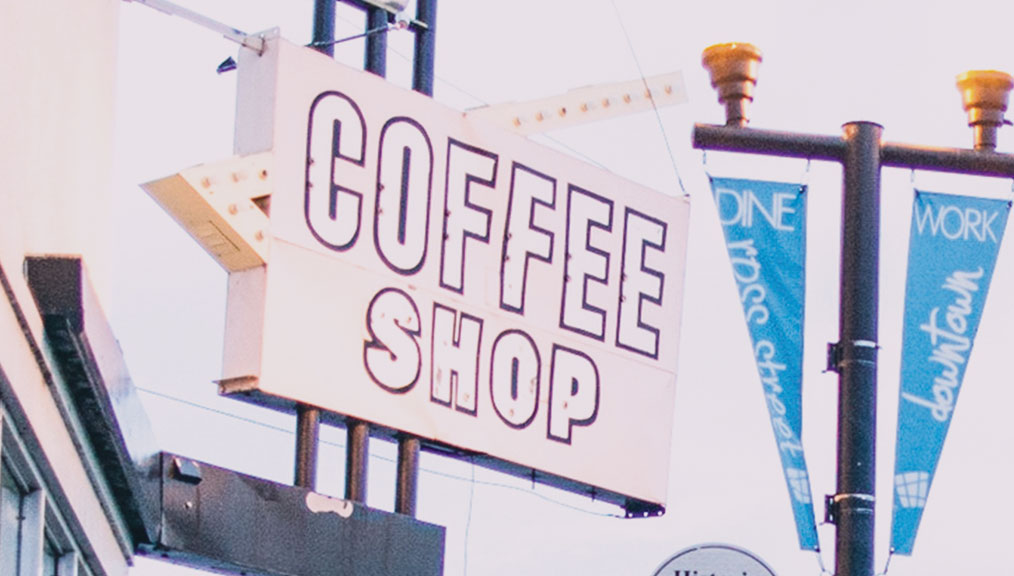(Photo: Priscilla Westra.)
[B]efore a café ever opens its doors, it all starts with an idea, and then a name.
The task of naming a shop can be as tricky as it is important. Café owners should think about their brand’s personality and characteristics, think about the idea that drives their business, even before brainstorming names. “Ask yourself: what do we stand for as a company?” says Sunny Bonnell, co-founder and creative director at Motto, a comprehensive branding agency. “That’s really something we push companies to get clarity on. Work through those things before working on a name.” Once you’ve established an identity, Bonnell recommends looking for inspiration just about anywhere: lists of names, history, music, and so on. “There’s not a wrong place to look. Maybe the only wrong place to look would be to your competitors,” she says.
According to Bonnell, names usually fall into one of three categories. Functional names are simple, describing exactly what the business does. Experiential names “make a direct connection to something real, a human experience,” Bonnell says, citing internet browser Safari as an example. Finally, evocative names, such as Target or Virgin, evoke the position of the company with images or connotations.
In addition, Bonnell listed naming criteria to follow. First, make the name meaningful and positive, “not boring.” Second, aim for something short that’s easy to pronounce and spell. Third, choose something with a visual element. Finally, the name should be distinctive and protectable, meaning, it should be original enough to set you apart from your competition and different enough that you can secure branding, an online presence, and potentially a trademark. Even at this early stage of the business, Bonnell recommends conducting a trademark search on the name you choose. “When you have a name that has these kind of qualities, you’re able to design a more robust brand, because you’re able to connect with something of meaning,” Bonnell says.
One simple place to start is with your surroundings.
At Olympia Coffee Roasting Company in Olympia, Washington, co-owner Oliver Stormshak says, “Every business owner has to look in the mirror and decide who they are, and who they want to be. I know for me, I’m a pretty serious person, and the name is serious.” However, Olympia is more than a place on a map. Stormshak explained that Olympia evokes its Greek roots, conjuring mythology and Olympians, as well as the entirety of the Olympic region in the Pacific Northwest. “Our town can be transported anywhere in the world and have meaning to everybody,” says Stormshak.
However, when Stormshak came on board in 2009, he struggled with whether to keep the name. After trying various marketing campaigns with different names, his team created an experiment in which they sent out five coffee bags, each with different branding, to friends and family throughout the US, and asked them to select the best coffee. All the coffee was the same—nothing was different but the look of each bag—but the exercise provided insight into what worked for their branding. Eventually, they reached a point where “we felt like this is who we are,” says Stormshak, and the name stuck.
For the lucky few, sometimes inspiration just strikes, as it did for Bow Truss Coffee Roasters in Chicago. As they built the location for their first café, they noticed its original bow truss ceilings. “We look at this beautiful building, this space is so cozy and this is what we’re all about: wide open and inviting,” says Darren Marshall, co-founder at Bow Truss. Now with eleven stores, not every location has bow truss ceilings, but Marshall says the comfortable aesthetic evoked by the original trusses remains a feature of every café. Even though in the beginning, the name plan was more drink-oriented, “You don’t always have to lead with coffee,” Marshall says.
Another place to seek inspiration is your personal interests. “I’m more than coffee,” says Dale Donchey, co-owner of Spiller Park Coffee in Atlanta. “If there was anything that would come in second to coffee, it’d be baseball,” he says. Drawing on his baseball love and an appreciation of Atlanta’s history, Donchey named his café after Spiller Park, a baseball stadium home to the Atlanta Crackers in the early 1900s. Donchey found symbolism in the park’s history and his own journey with coffee. When the stadium, then Ponce de Leon Park, burned down in 1923, RJ Spiller rebuilt it into one of the most advanced stadiums in the country, and it became known as Spiller Park. When Donchey’s first coffee shop fell apart, he viewed his second attempt as his own version of Spiller Park—a chance to start over and build something better than before. He also doesn’t see coffee and baseball as so different. “Both of them are about bringing people together, having someone to root for, and that team bravado,” Donchey says.
Once you’ve sought inspiration wherever you can find it, whether around the corner or back in time, and you’ve narrowed down your list of names to just a few, Bonnell offers one last piece of advice: “Create something you feel can be the linchpin to a larger story.”
Kaitlin Throgmorton is a writer based in Raleigh, North Carolina. Photo by Priscilla Westra.







